Extremely high new and used car prices have forced buyers to seek out "older" vehicles as a way to better fit their budgets. And of course, "older" vehicles raise the risk of costly maintenance and reliability issues.
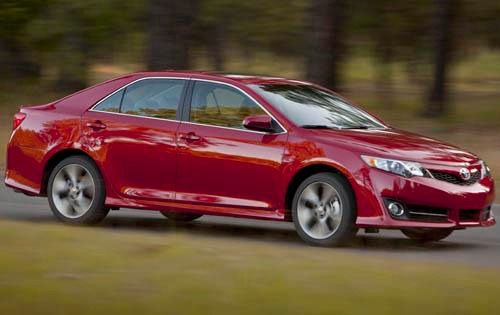
And while these are important issues for all carmakers, Toyota is one of the strongest brands ever when it comes to durability and longevity. Most well-maintained Toyota vehicles are expected to last in the 300,000 mile range, while many have reached 500,000.
So many car buyers today are taking good, hard looks at older, say 10- to 15-years-old, Toyotas in this time of very high prices.
We'll review the pros and cons of some of the most popular older Toyota models here.
Older Reliable Toyota Models
Toyota Avalon: Ever since its debut in the mid-1990s, the Toyota Avalon has earned high praise for its solid performance, spacious cabin, long list of features, smooth ride and strong reputation for reliability.
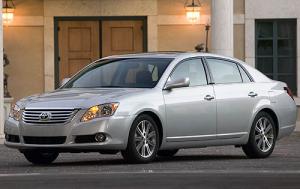
It was actually the third generation Avalon, produced for the 2005-2013 model years, that elevated it to likely the best available for those under $40,000 at the time. This total redesign created an overall more refined sedan with significant mechanical improvements, additional power and a more capable suspension.
This Avalon is front-wheel-drive only and was available in three models: XL, XLS and Limited. But even the base XL is very well-equipped, including standard features such as a power driver seat, automatic climate control, 16-inch alloy wheels, electroluminescent gauges, a CD player, a cabin air filter and a tilt/telescoping steering wheel.
Avalon Overall Pros: Comfortably accommodates five adults, very attractive interior, loads of available upscale features, smooth and quiet drive, powerful yet fuel efficient V6, high crash test ratings.
Avalon Overall Cons: Pricey, rear seats don't fold, not a sporty handler.
Toyota Camry: The Camry has long dominated the midsize sedan market here in the U.S. for the last 35+ years. And it's always been a solid choice as a used car due to its proven high build quality, comfortable drive and long-term durability.
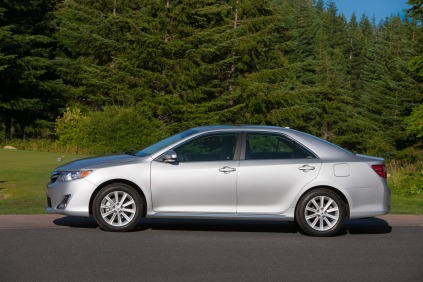
The sixth generation Toyota Camry debuted for the 2007 model year and carried through the 2011 model. It's a front-wheel drive, midsize sedan offered in base, LE (the most popular), SE (sporty) and XLE (more luxury-oriented) models.
But even the base Camry is already well-equipped with standard features such as full power accessories, stability control, antilock brakes (ABS), cruise control, air conditioning, a tilt/telescoping steering wheel, a 6-speaker CD sound system, Bluetooth and satellite radio.
Also definitely on the radar should be the seventh generation, produced from 2012 through 2017. The standard engine in this version was upgraded to a four-cylinder, 2.5-liter that produces 178-horsepower. And there are some SE and XLE models to be found with the optional 3.5-liter V6 with 268-horsepower.
You May Also Like:
Is It A Good Time To Buy A New Toyota?
Do This To Get The Best Trade-In Value
How To Get The Lowest Rate Car Loan
More standard features were also added, including cruise control, power windows, a power tilt-and-telescoping steering wheel and USB and Bluetooth ports. Higher trim levels also included keyless entry, aluminum wheels and an upgraded suspension.
Camry Overall Pros: Strong yet fuel-efficient V6 engine, smooth ride, roomy cabin, outstanding reliability record, high resale values, excellent crash test scores.
Camry Overall Cons: Interior has some low-quality plastics, numbish steering, some fit and finish flaws.
Toyota Corolla: The tenth generation Corolla was produced from 2009 through 2013. Powering this version is a 1.8-liter inline-4 that's good for 132-horsepower and 128-pound-feet of torque. It's paired with either a 5-speed manual transmission or a 4-speed automatic.
It's EPA gas mileage is a very 26 mpg city and 34 mpg on the highway with the automatic, and 28 and 35, respectively, with the manual.
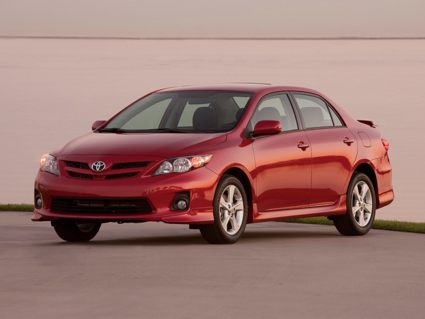
Having also proven it's reliability over time, its standard features include air conditioning, power mirrors, a tire-pressure monitor, intermittent wipers, a theft deterrent system, a 4-speaker audio system with a CD player and an auxiliary audio jack, antilock brakes (ABS) with brake assist, traction control and stability control.
Moving up to the LE adds cruise control, remote keyless entry, power windows (optional on the base), power doorlocks and a 6-speaker stereo, while the Corolla S adds foglamps, a trip computer, upgraded cloth upholstery, 16-inch alloy wheels, steering-wheel audio controls, a sporty body kit and a rear spoiler.
A sunroof was an option on the LE and S models while there was also a Premium package for the LE that included 16-inch alloy wheels, an upgraded sound system, foglamps and the sunroof.
Corolla Overall Pros: Excellent dependability reputation, good gas milage, roomy and good quality cabin.
Corolla Overall Cons: Uninspiring road manners, few upscale features, some important safety features were optional.
Toyota Prius Hybrid: Like many Toyota vehicles, the Prius has become the standard-bearer in the hybrid market. It's third generation was produced from 2009 through 2015 and was years ahead of the competition. It's most notable for its fuel economy, relatively undiminished driving ability and reasonable price.
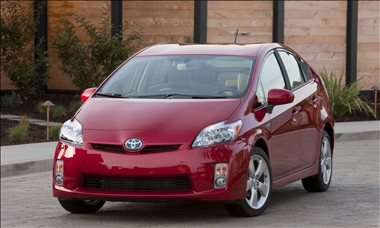
Standard features on the Prius I include power windows, power mirrors, power doorlocks, 15-inch steel wheels, a height-adjustable driver seat, a tilt/telescoping steering wheel and a 60/40-split-folding rear seat, while the Prius II adds cruise control, keyless entry/ignition, 15-inch alloy wheels, automatic headlights, heated exterior mirrors and a 6-speaker audio system with a CD player and an auxiliary audio jack.
The Prius III adds Bluetooth as well as an 8-speaker JBL audio system with a 6-disc CD changer, while the Prius IV goes on to add leather upholstery, heated front seats, exterior locking buttons for keyless entry, an auto-dimming mirror and driver lumbar adjustment.
The top-of-the-line Prius V then added foglamps, LED headlamps with auto-leveling and washers, and 17-inch alloy wheels.
Prius Overall Pros: Outstanding gas mileage performance, low emissions, futuristic interior, ample cabin room, very maneuverable in tight areas.
Prius Overall Cons: Some lower grade interior plastics, noisier than other compact cars when using the gasoline engine, visibility is not as good as some competitors.
Toyota Tacoma: The Tacoma has pretty much become the mainstay of the compact pickup truck market. With a wide choice of available body styles, it's extremely versatile as either a work truck or simply used for everyday transportation.
It also has very good 4x4 capabilities and a strong reputation for durability.
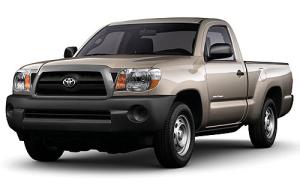
The second generation Tacoma was produced from 2005 - 2015 and has been very highly regarded. This Tacoma comes with either a 4-cylinder 2.7-liter or V6 4.0-liter engine and both are quite capable. The 4-cylinder comes with either a 5-speed manual or 4-speed automatic transmission. The V6 offered the choice of a 6-speed manual or 5-speed automatic.
This generation has more power, more room, bigger towing capacity, and the exact same gas mileage as its predecessor. They're also known to still be on the road hundreds of thousands of miles later.
It should be noted that stability and traction control, front seat side airbags and side curtain airbags were optional features before the 2009 model, so some of these older Tacomas may not have them. In addition, power door locks and windows were also optional for the first four years of this generation.
Tacoma Overall Pros: Solid build quality, lots of trims/body styles, nice balance of power and fuel economy, well-equipped interior, good off-road abilities.
Tacoma Overall Cons: V6 engine can be noisy, low seating position.
Toyota Tundra: Like the Tacoma, with it's many configurations the full-sized Tundra pickup can used primarily as a work truck or simply for family transportation. Noted for its impressive driving comfort and refined V8 engine, it also has lived up to Toyota's excellent reliability track record.
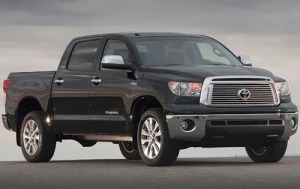
The second-generation Tundra, produced for the 2007 through 2021 model years, with several facelifts along the way, features a fully boxed frame, three different cab sizes and bed lengths, and your pick of three engines.
"Three" seems to be the magic number when choosing a used Tundra. There's also three wheelbases and three trim levels. Three-passenger, two door regular cabs come as either the basic DX model or more uplevel SR5 trim. Both the Double Cab and longer CrewMax crew cab seat six, have four doors, and can be found in SR5 and top-of-the-line Limited models.
Engine options include the standard 4-liter V6 capable of 236-HP up to a 5.7-liter V8 with 381-HP of performance. The popular Limited models have leather upholstery and some can be found with the optional 20-inch wheels, as opposed to the standard 18s.
CrewMax models have a power rear-cab window and some can be found with the optional DVD entertainment system.
Some of these older Tundras can also be found from time to time with the off-road package and a navigation system with a rearview camera that shows the trailer hitch.
Tundra Overall Pros: Powerful 5.7-liter V8 engine, hefty towing capacity, lots of convenience features, wide choice of body styles, potent 5.7-liter V8, ample passenger space.
Tundra Overall Cons: A somewhat rough ride, some hard interior plastics, less attractive cabin than rivals, long reach to audio controls.
Toyota Rav4: The RAV4 was one of the first compact SUVs in the market and is another top-rated Toyota model. Third generation RAV4s were produced from 2006 to 2012 and were an evolved, small SUV that kept getting better and better.
This RAV4 has favorable driving dynamics, fuel-efficient engines and high quality materials.
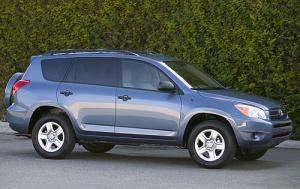
This version can be found in Base, Sport and Limited models, with either a four-cylinder or V6 engine, and either front-wheel drive or all-wheel-drive. The standard transmission is a 4-speed automatic for the four-cylinder and a 5-speed automatic for the V6.
It also grew to nearly the length of Toyota's midsize Highlander while its 3.5-liter V6 is actually more powerful, producing a hefty 269-horsepower. Still, due to its narrower width and overall lighter weight, it has the advantages of being easier to park and gets better gas mileage than its predecessor when similarly equipped.
In fact, it's one of the most fuel efficient V6's in its segment.This version is larger than its predecessors and represents the first RAV4s available with a V6 engine and a third-row seat.
RAV4 Overall Pros: Nice combination of ride quality and handling, powerful yet fuel efficient V6, passenger-friendly second-row seating, solid crash test ratings, low cargo floor, high build quality.
RAV4 Overall Cons: Interior less impressive than rivals, driver seat is tight for tall drivers, side-hinged rear gate interferes with curbside loading.
Toyota 4Runner: This is Toyota's traditional truck-based SUV and is an excellent choice for those seeking size and comfort, but who also need something rugged and durable. The 4Runner is really at its best off-road.
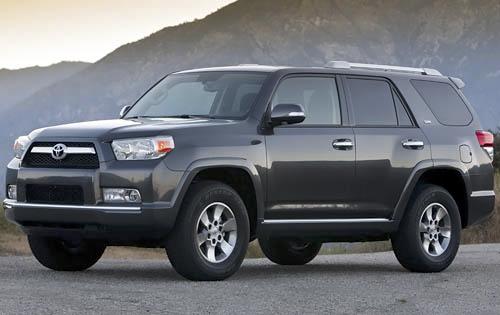
The fifth generation 4Runner has been produced since 2010. Based on the same platform as its rough-and-tumble sibling, the FJ Cruiser, this 4Runner remains devoted to outdoor enthusiasts who value toughness in a taller, wider and longer package than the previous model.
While of course featuring its renowned solid rear axle for better off-road performance, this production run upped the performance-ante with a new available Kinetic Dynamic Suspension System (KDSS), which is able to disconnect the front and rear stabilizer bars when traveling below 40 mph for increased wheel contact on uneven terrain.
And style-wise, the 4Runner's new front grille and fender flares produce an updated and edgier look.
Also new was the somewhat curious return to an available four-cylinder 4Runner (last offered in 2002). It's curious because it lacks the punch normally associated with a 4Runner and is mated with a basic 4-speed automatic transmission. And all while getting essentially the same gas mileage as the 4.0-liter V6.
But there are plenty of standard features across the board. Even the base SR5 model came already well-equipped with standard features such as full power accessories, cruise control, automatic climate control with rear vents and a trip computer.
The Sport Edition comes with more than just an appearance package (roof rack, side steps, fog lights). It has larger front brakes, 17-inch wheels and an upgraded suspension system.
The top-of-the-line Limited added leather upholstery, keyless ignition, a 15-speaker stereo system with a 6-disk CD changer, dual climate control and 20-inch alloys.
4Runner Overall Pros: Smooth highway drive, long list of standard equipment, powerful V6 engine, excellent off-roader.
4Runner Overall Cons: Below average storage room, third-row has little legroom and doesn't fold flat.
Toyota Sienna: The Sienna is another nameplate vehicle in its class. This minivan has some of the best crash test scores in the market. In addition, the V6 engine is refined and fuel efficient while this vehicle has earned an enviable reputation for reliability and long-term durability.
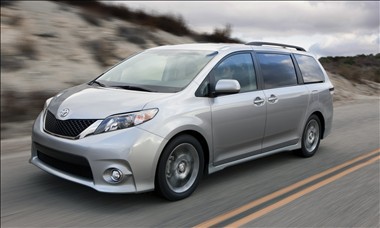
The third generation Sienna was produced from 2011 to 2020, with facelifts in 2015 and 2018. With a solid reputation for dependability and low maintenance costs, this Sienna also offers a smooth and powerful V6 engine, a comfortable and spacious interior and available all-wheel drive (AWD) versions.
The Sienna has always been a leading minivan and new for this production run was the introduction of a four-cylinder model, a 6-speed automatic transmission, a split-screen display monitor for the rear entertainment system and optional second-row reclining seats.
What's more, a new sportier model was introduced, the Sienna SE, that features a sport-tuned suspension along with more aggressive styling.
Powering the base and LE models is a new 2.7-liter inline-4 that produces 187-horsepower. Also available on these models, and standard on the others, is a 3.5-liter V6 that's good for 265-horsepower.
All models were equipped with the new 6-speed automatic transmission, while some Sienna LE, XLE and Limited V6 trims can also be found with the all-wheel drive.
Sienna Overall Pros: Smooth and powerful V6 engine, very comfortable ride, loads of convenience features, solid build quality, available all-wheel drive.
Sienna Overall Cons: Below average handling when compared to the Honda Odyssey and Kia Sedona.
It should be noted that no matter which Toyota you may be interested in, it is true that they're a bit pricier than most of the competition. This is primarily due to their higher overall quality and stronger resale values.
Older Toyota Mechanical Problem Watchlist
While Toyota has a top-motch reputation for reliability, all used vehicles require regular maintenance and could run into necessary repairs. The specific mechanical problems that older Toyotas may experience can vary depending on mileage, maintenance history, and driving conditions.
However, there are some common issues that Toyota vehicles from this age range might encounter and should be checked for pre-purchase. Keep in mind that Toyota's reputation for reliability means that many of these problems may be less common and less severe compared to some other brands.
Rust: Depending on the climate and how well the car has been cared for, rust can be a concern, particularly in areas with harsh winters or high humidity.
Engine and Transmission Issues: Over time, you may encounter problems with the engine or transmission, such as oil leaks, worn-out gaskets, or transmission shifting issues. These can be expensive to repair.
Suspension and Steering Components: As vehicles age, components like struts, shocks, and control arms may wear out, leading to a less comfortable ride and potentially affecting handling.
Brake System: Older Toyotas may require brake system maintenance, including replacing brake pads, rotors, and brake lines.
Electrical Issues: Electrical problems, such as issues with power windows, door locks, or sensors, can arise with age.
Exhaust System: The exhaust system may develop rust and corrosion, which can lead to leaks and noise issues.
Cooling System: Radiators and cooling system components can wear out, leading to overheating problems if not properly maintained.
Air Conditioning and Heating: Older Toyota models may experience problems with the air conditioning and heating systems, including issues with the blower motor or A/C compressor.
Fuel System: Over time, fuel pumps and injectors can wear out, and fuel lines may develop leaks.
Again, it's important to note that the likelihood of encountering these issues depends on the car's maintenance history and how it has been driven. Regular maintenance and timely repairs can help mitigate many of these problems.
Before purchasing an older used Toyota, it's advisable to have the vehicle inspected by a trusted mechanic. Additionally, looking for a well-documented service history can give you additional confidence in the car's maintenance and care.
 By Josh Rosenberg
By Josh Rosenberg